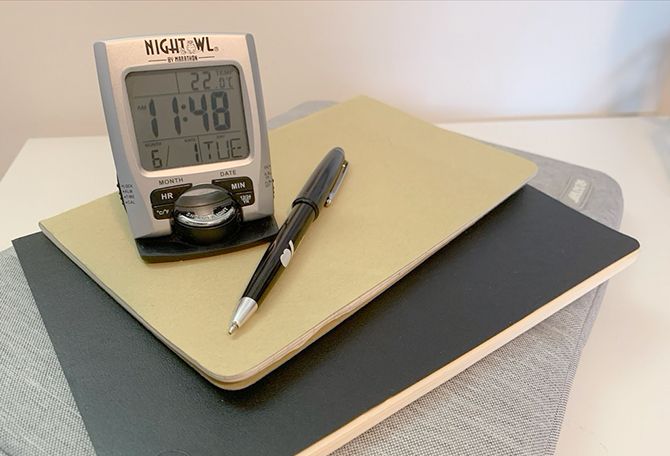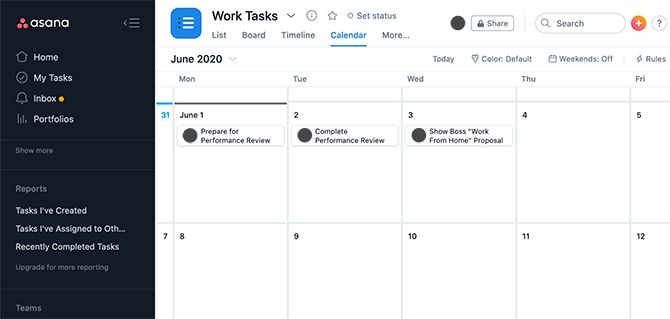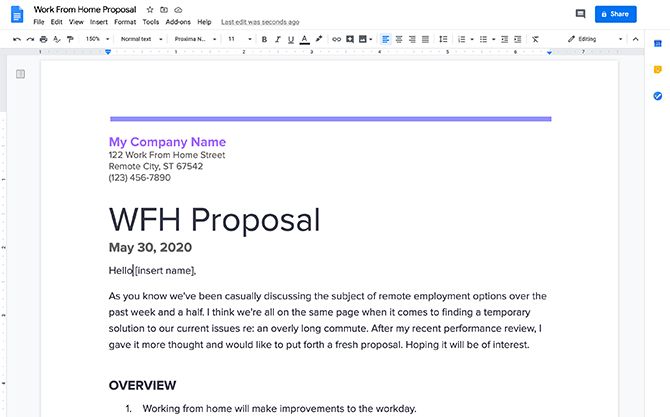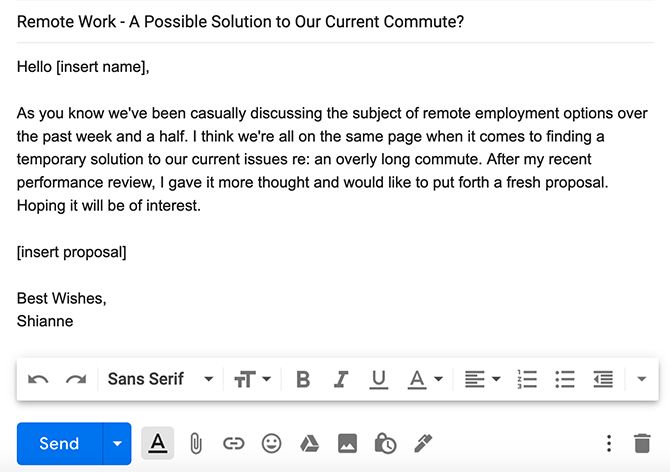For many people, working from home was a dream. Imagine waving goodbye to a grueling commute and office politics. Sounds great, right? Unfortunately, even if you know that working from home is the best option, convincing your boss to let you make the switch is not easy.
In the current era with an ongoing pandemic, however, working from home might also become a necessity. So, here are some helpful tips and easy exercises to prepare you to sway your boss.
Can I Work From Home?
According to a study by Global Workplace Analytics, over 56 percent of employees in the US "have a job where at least some of what they do could be done remotely." Just over 40 percent of the current workforce also "work remotely with some frequency."
With the state of employment in 2020, that number is set to rise.
To emphasize just how much things have shifted: Twitter recently announced that employees could work from home indefinitely, as reported by Forbes and other outlets. Other companies are also starting to realize that working from home can be a boon for employers if they're looking to cut back on rental office space.
Additionally, since the early 2000s, the number of teleworkers in the US has skyrocketed. The internet has revitalized legitimate work from home jobs. And a Microsoft white paper cited by Forbes also shows why the idea of remote work is so appealing.
The top five benefits of working from home, as cited, are:
- A healthier work/life balance. (60%)
- Less money spent on gas. (55%)
- Less time spent sitting in traffic. (47%)
- The ability to be more productive when working from home. (45%)
- Less distractions. (44%)
Faced with these kinds of benefits, working from home seems like an obvious choice.
That said, you also need to see this from your boss's perspective. If they aren't used to the concept of non-traditional workspaces, they probably harbor doubts about your potential transition.
This is why you need to be armed with the relevant tools, information, and strategy to put them at ease.
Does Work From Home Reduce Productivity?
When it comes to learning how to work from home effectively, not only are you asking your boss to trust you to focus, you're also asking to work with much less guidance than you had before.
While some folks are naturally skilled at independent work, from your boss' perspective there is still cause for concern. This worry boils down to the fact that they have no pre-existing knowledge of how you'll work in a different environment.
Will your current productivity levels keep up?
Fortunately, plenty of studies have shown that these worries are vastly misplaced. If you've casually mentioned working from home to your boss, it might be worthwhile to send them links to relevant studies, especially if they're anxious about the aforementioned productivity.
Let's run through those stats now.
Here Are the Numbers
- One Stanford study showed that working from home increases individual productivity by 13 percent. Of that number, "9% was from working more minutes per shift (fewer breaks and sick days), and 4% from more calls per minute (attributed to a quieter and more convenient working environment)."
- A 2015 survey by CoSo Cloud also found that 52 percent of workers were "less likely to take time off when working remotely---even when sick... Overall, 44% have a more positive attitude, and 53% report reduced stress. 51% spend more time with their significant others, adding to greater job satisfaction."
- Also, a 2014 State of Telecommuting PGi report found that 82 percent of telecommuters experienced less stress, 80 percent experienced improved morale, 70 percent saw an increase in productivity, and 69 percent saw an improvement in absenteeism.
Basically, the numbers are on your side when it comes to productivity in work from home environments. This doesn't even begin to touch on the potential employer savings in overhead costs (such as office supplies and snacks), environmental benefits, and reduced employee turnover.
When Should You Ask to Work From Home?
The timing of when you should ask your boss is important. The question should be posed when your employer is in a confident state of mind about your work. It should also be done in a way that makes it clear that your boss will be getting more benefits by letting you work out of the office.
As Ramit Sethi points out in his best-selling book I Will Teach You To Be Rich, this conversation would ideally happen soon after you've received a positive performance review.
To keep track of when you need to ask your boss, we also recommend a project management tool like Asana. To learn more about this app, read our beginner's guide to using Asana for any project.
How to Prepare Your Work From Home Proposal
Now that you've found the perfect time to propose this work from home solution, you need to prepare your proposal. After all, even with the numbers on your side, there are other practical issues that might get in the way of receiving a thumbs up.
Before you ask, you need to prepare a plan to show how you'll adapt to this new working environment. Basically, the aim is to walk into that meeting knowing that you have every angle covered, and to cause as little inconvenience as possible.
When mapping out your proposal, it's best to turn it into a concise document that you can leave with your employer, if they request it. Remember, the trick is to be thorough, but short. No one likes reading rambling, page-long essays.
When crafting this document, any word processing program should do. For this article, I'm using Google Docs as an example.
You can also use this list of checkpoints below as a guide for what should be covered in the document itself.
Working From Home Will Make Improvements to the Workday
First, explain current frustrations and bottlenecks to your workflow within the office. Perhaps too many distractions interfere with your ability to complete your task.
Point out how these issues have the potential to affect the productivity of all workers in the office, not just yourself. Explain that some of these issues would be resolved if you and the others could at least partially work from home.
Working From Home Will Not Cause Connection Issues
Your boss might be worried that you don't have a reliable or fast enough internet connection. To allay this fear, you can run an internet speed test using a site like SpeedTest or Fast.com. If your personal connection is too slow, you can take steps to improve it.
If your wi-fi goes down for any reason:
- Be sure to have a backup solution to deal with this loss.
- Reassure your boss that if there are any serious issues that occur, you can still make it to the office same-day as needed.
Please Note: If a long commute was the main reason you wanted to work from home, your argument that you can make it to the office will appear flimsy.
Access to Software and Company Data
You might require access to certain software applications. Make sure that you can access all these applications on your own, too.
- If you have a company laptop, this should be easy enough.
- Also, if you need to access company data on a company server, you might already have access to a VPN connection. If not, your IT department might be able to help you out.
- If you're planning to use a personal computer, however, you'll have to figure out a way to access this software and data securely.
- You'll need to learn about how VPN tunneling protects privacy, too.
Working From Home Will Still Allow for Constant Communication
Another worry for most employers is that you may not be as open to communication as you were in the office.
Ease this worry by explaining that you will be available to talk, just as you were on-site, via phone, email, Skype, Google Hangouts, Slack, or your company's specific communication tool.
If needed, you could also suggest one of these collaboration tools for remote workers, too.
Performance Reviews Still Apply
To help your boss keep an eye on the work that you're actually completing at home, suggest a regular performance review of your weekly goals.
This simple step could be something like sending a regular email to keep your boss up to date on your progress. You can discuss what you've done, any problems you may be having, or any breakthroughs that you've made.
How to Ask to Work From Home
To quote Ramit Sethi's book, after a positive performance review, you could say something to your boss like:
"I'd love to provide even more value to the company in the future. But lately, I've been getting burnt out from the commute. It would make a world of difference if I could work from home a day or two each week."
After explaining why you think working from home would solve this issue, Sethi advises people to keep quiet and wait for a reply.
At MakeUseOf, we also recommend that you make it clear during your proposal that you've already checked out your own plan to see if it's achievable. You can also offer to send over a short document explaining this plan, at your boss' behest.
Working From Home Is Achievable
With all these steps in play, hopefully your boss will agree to let you do a trial run. If that trial goes well, you'll be in a great position to request to work from home more regularly. If that happens, check out these essential apps for working from home.
Now, it's up to you. Here's how to tell if you have the self-discipline to work remotely. Additionally, if your boss absolutely refuses to let you work from home, and you absolutely need to, then you can also check out our list of the best companies that offer remote working jobs.






